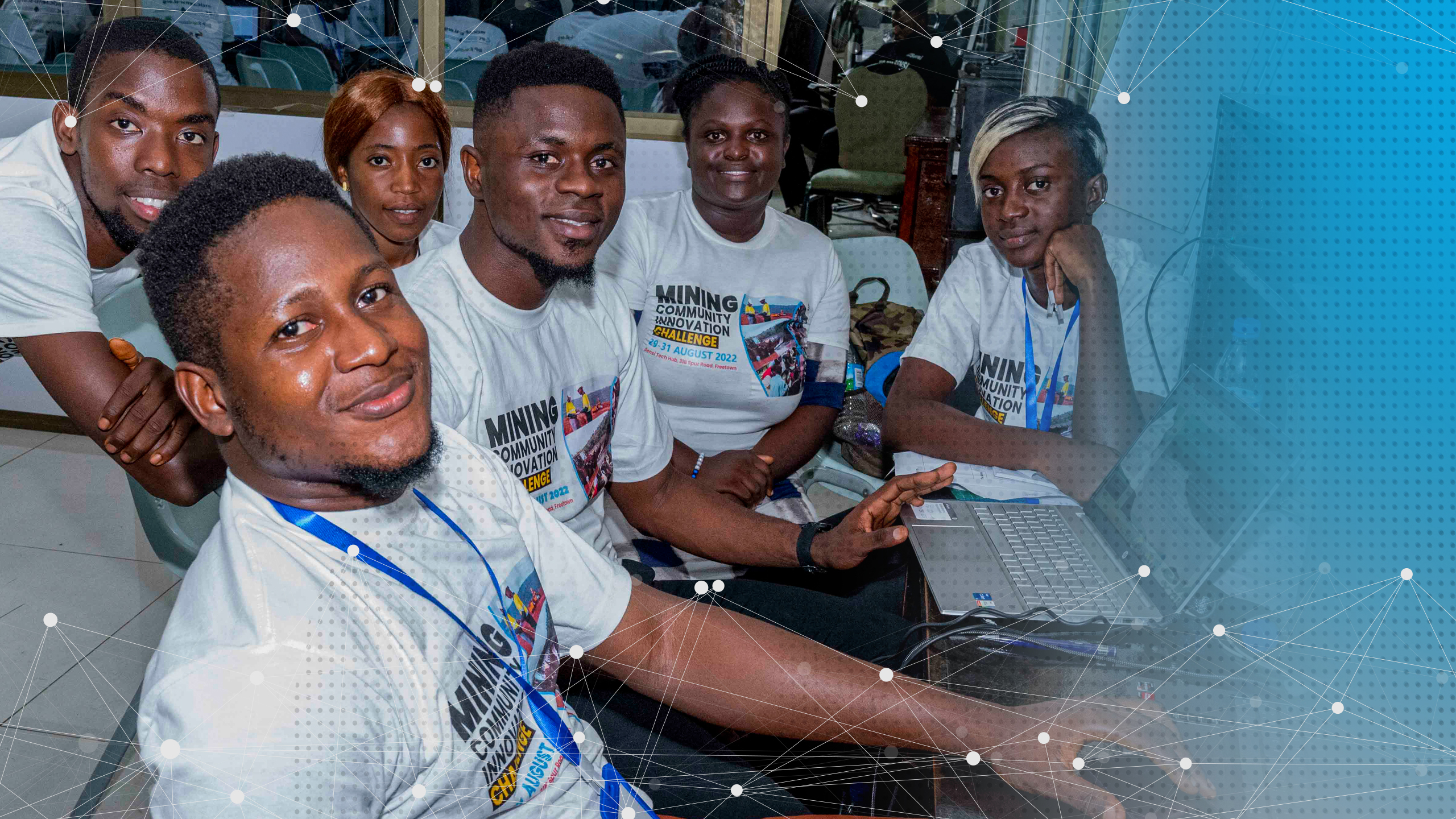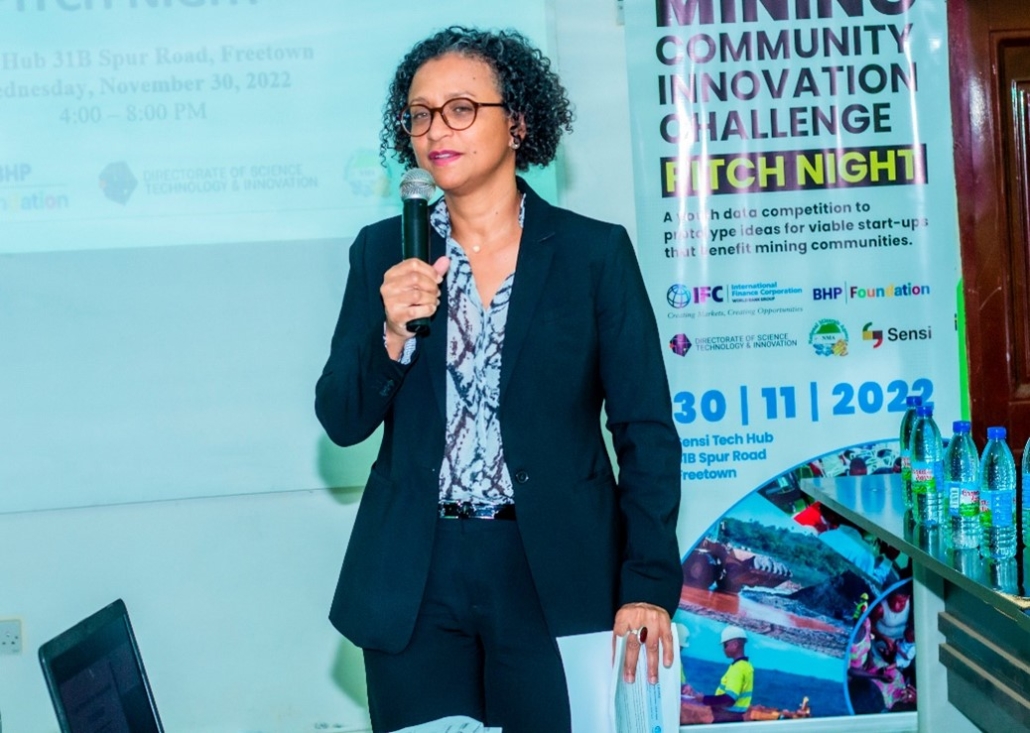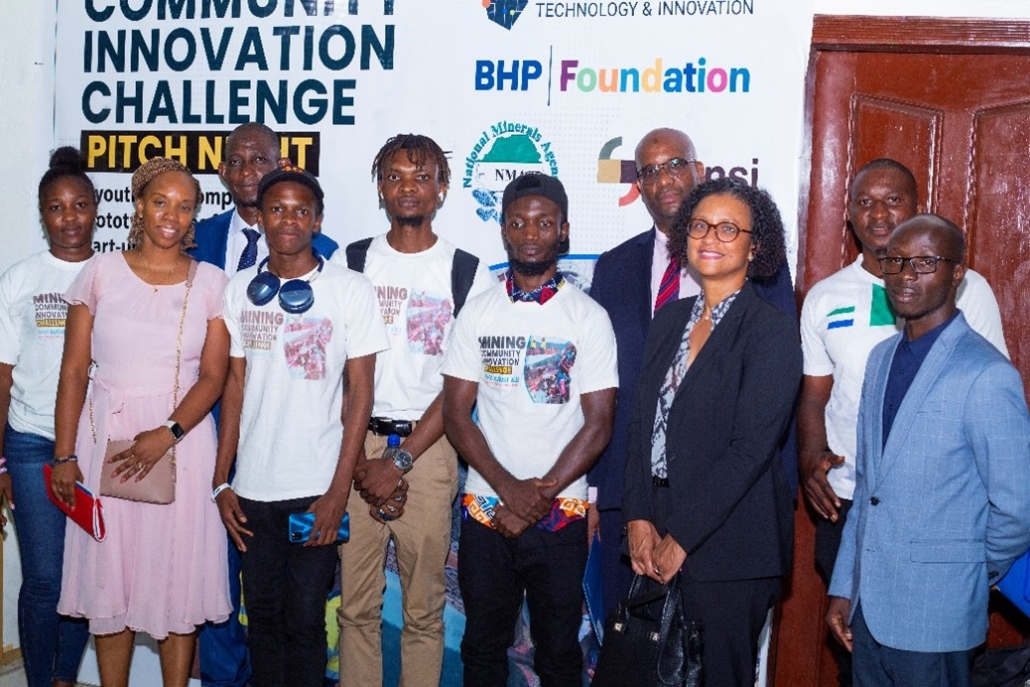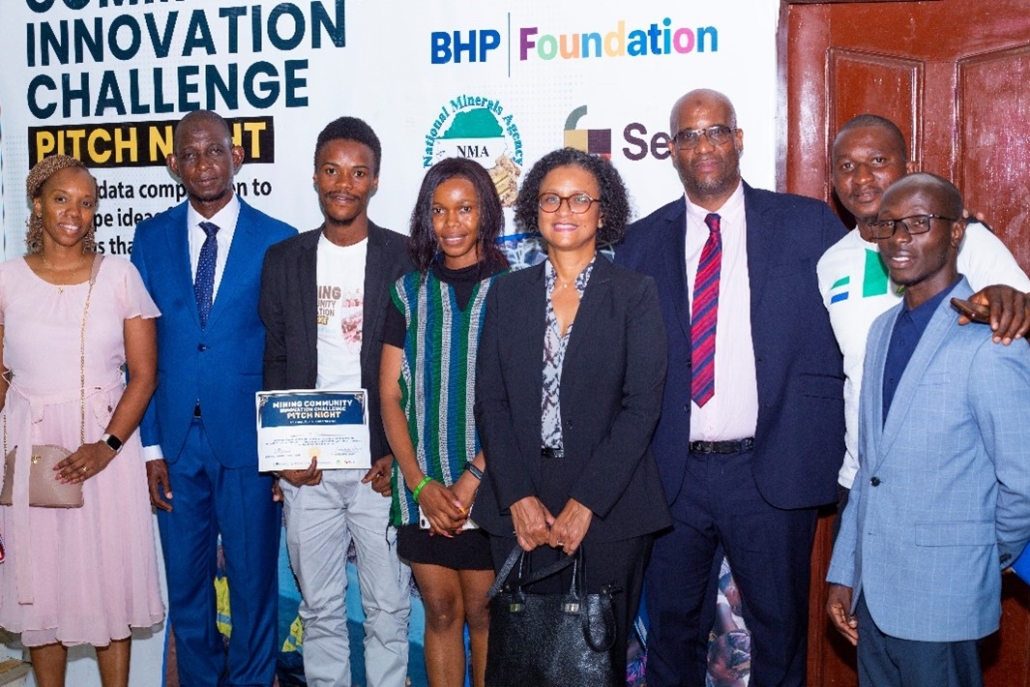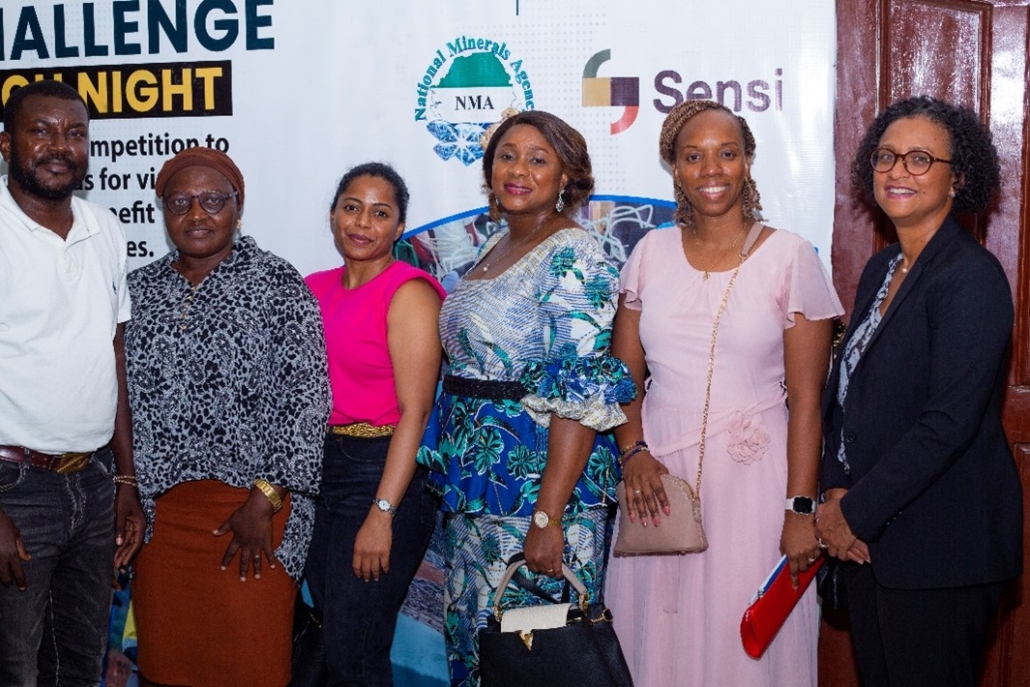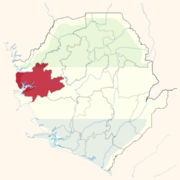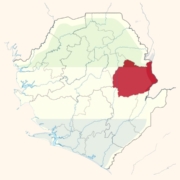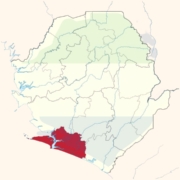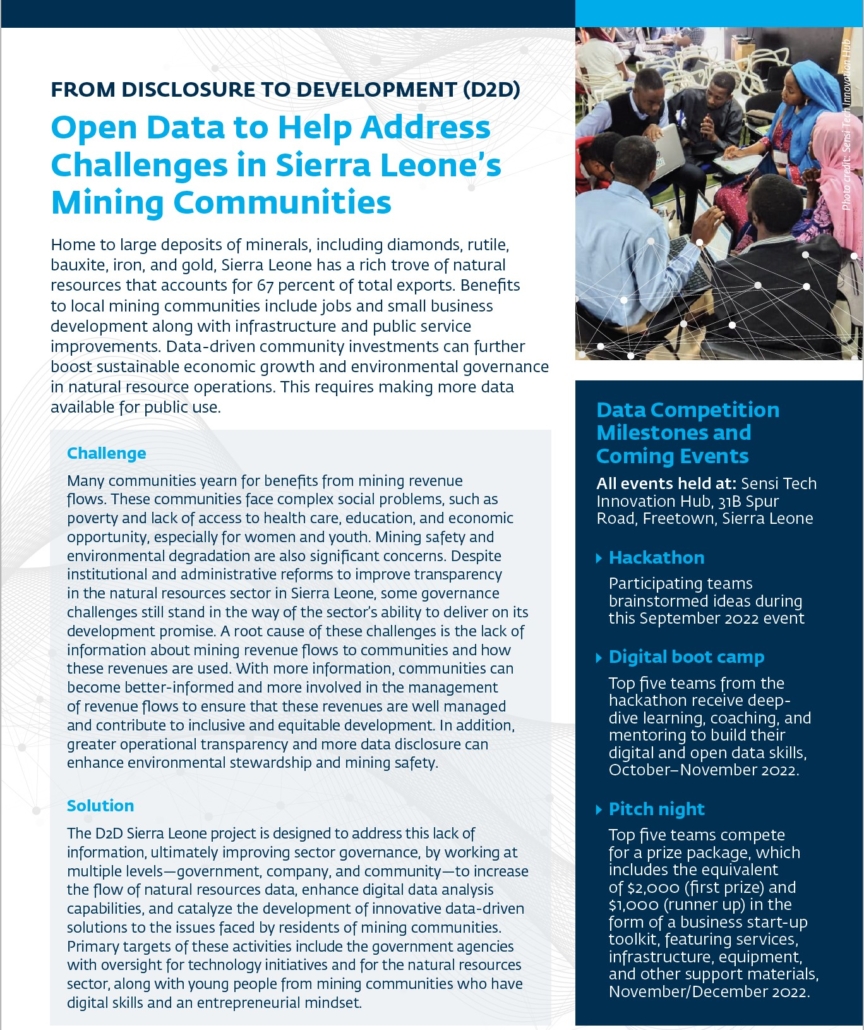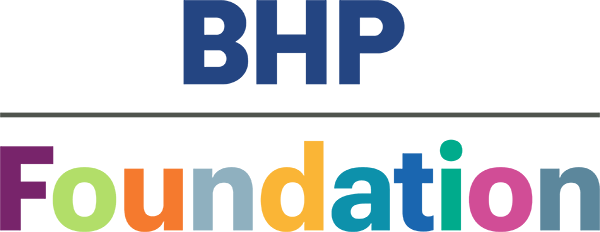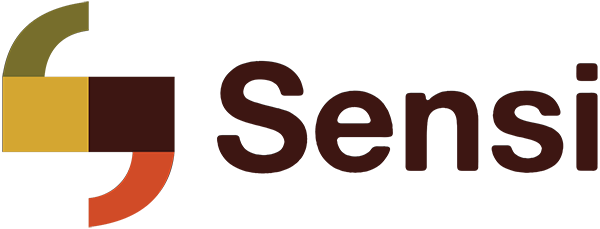Hackathon & Open Data Competition
A platform for young innovators to use open data, enhance digital skills, and innovate solutions to the challenges facing mining communities.
The Mining Community Innovation Challenge (MCIC) is an open data competition and hackathon co-organized by IFC in collaboration with the World Bank, the Directorate of Science, Technology, and Innovation (DSTI), National Minerals Agency (NMA), and Sensi Tech Innovation Hub. The initiative was developed to support young Sierra Leonean innovators to prototype data-driven ideas for digital solutions that will benefit mining communities, with a path to creating viable start-ups. MCIC is supported by the From Disclosure to Development (D2D) program in partnership with BHP Foundation.
Hackathon and Training
A hackathon held in September 2022 kicked off the initiative, involving 93 youth participants in 16 teams, representing Freetown and 12 other mining communities, including Kono, Rutile, Bo, and Lunsar.
At the end of the hackathon, judges selected five teams for a two-month, intensive digital and business skills learning and mentoring program. The learning program was designed to help teams further develop their business concepts, all of which use open data and digital tools to address specific mining community challenges: increasing access to clean water, creating employment opportunities for youth in agriculture and youth with disabilities, improving health and safety, and raising awareness on gender inequality in mining communities. The five finalist teams also visited the Lunsar mining community to socialize their concepts with community members and carry out data collection—a field trip facilitated by the Lunsar Youth Organization.
Final Pitch Night
On November 30, 2022, at the culminating event of the challenge – Pitch Night, the five finalist teams presented their start-up concepts to a panel of six distinguished judges, including several from mining companies. Team Smart Cure, a start-up with a data-driven solution to increase access to clean water, took first place honors. Team Digital Agro, a start-up creating employment opportunities for youth with a platform that connects greenhouses with young workers and produce buyers, took second place.
The winning teams received awards equivalent to $2,000 (first place) and $1,000 (runner up) to support scale up. They will also have opportunities for additional expert mentorship to refine and ultimately roll out their businesses. The skills and connections all teams gained through the project will help them in their future work towards using digital innovations for addressing local issues, while boosting their qualifications to secure jobs in the digital economy.
The Finalists
Winner
Smart Cure (aka: “Smart H2O”)
Smart Cure (aka: “Smart H2O”) consists of three engineers and a market researcher. During the project, the team invested in building a prototype device that measures water quality and gives an alert when water quality does not meet safe drinking standards. The price point for the device is currently $500 per unit; so, part of their product development model includes finding a lower-cost solution and ruggedizing the device. The team bases their revenue model on donations, hardware sales, and research contracts and will require a partnership with an organization that provides water purification technology to communities where their device identifies unsafe conditions. This team explored open data to show the extent of illnesses caused by unsafe drinking water in the communities. Although the exact data they were after was hard to find, the team leveraged data from SDG-6 data portal to understand the impact of their solution. In addition, they also used data from Njala University.
Runner Up
Digital Agro
Digital Agro envisions an end-to-end digital agribusiness platform featuring greenhouse farming technology with an aim to combat food shortage, especially in remote mining villages. Faster growth with higher yields and enhanced quality of the harvest promises both food security and increased revenue to mining communities. Mining activity often leads to competition for labor and an increased cost of other farm inputs. When not managed responsibly and sustainably, mining can also cause environmental pollution. The team’s solution targets farmers, produce buyers, and unemployed, unskilled youth. Through a combination of soil testing, land management, buyer/seller mediation, and skills training, the team hopes to engage 3,000 farmers in a profit-sharing model to achieve sustainability and growth. This team collected community data from field trips to aid their research. To strengthen their solution, they will also aim to tap into open data sources on weather and climate from the Sierra Leone Ministry of the Environment and the Environmental Protection Agency.
Honorable Mentions
Women In Mining
Women in Mining focuses their solution on equitable opportunities and ways to reduce the challenges that women and girls in mining communities face, including rape, child labor, adolescent pregnancies, and domestic abuse.
More
Their plan is to develop an e-learning web platform for women and girls that will give them access to online skills training and build a training center that offers a three-month offline skills training program in selected mining communities. They hope to forge partnerships so that they may serve 10% of the target population and impact a community of two million women and girls. This team needed data on the prevalence of problems that women face in communities such as rape and domestic violence but was not able to locate any open data sources. They referred to articles and publicly available statistics for research on their solution but could not access the underlying data.
Tech Doctor
Tech Doctor aims to build a web and mobile phone application to facilitate access to doctors or health information such as: first aid, appointments with doctors, emergency response, and information about the nearest health centers.
More
Their revenue model rests on a low-cost (around US$0.60) monthly subscription service for users and a moderately-priced (US$3) monthly membership fee for participating doctors. Tech Doctor intends to roll out the program nation-wide and further expand into other countries. The team was already committed to healthcare services in mining communities when they entered the competition and have demonstrated their passion throughout the program. The team is also interested in collaborating with global health data aggregators so that the usage data they collect may be leveraged to improve the level of health throughout Sierra Leone. In terms of data requirements for their solutions, this team has the most data-driven solution as their solution needs to be able to access current data on location of hospitals to provide recommendations to their clients. The data on hospitals and clinics which have GPS coordinates was shared by DSTI and can be considered an open dataset. In addition to this, the team planned to generate their own data by working with professional bodies for medical personnel.
Growth Vision
Growth Vision bases their proposal on an observation that people with disabilities are unjustly burdened with below-average education and employment opportunities, cultural discrimination, and exclusion from leadership roles.
More
The team plans to develop a web-based employment services site, matching mining companies with eligible persons with disabilities from within the local community. They further intend to work with government bodies to defend and support people with disabilities throughout Sierra Leone. The team is developing a web site that allows individuals to upload their resumes and companies to advertise job openings. Their revenue model is based on donations and partnerships as well as income from corporations that wish to attract employees. This team relied on data from the 2015 disability report. The team also accessed useful open datasets on population from Statistics Sierra Leone.
Pitch Night Photo Highlights
Hear From the Challenge Participants
“It was a huge success. I didn’t realize there was so much data available.”
“It was super night for me because I was able to present my idea in a well-organized environment. The staff was very supportive to our team. I think data and technology can really help to solve problems in mining communities. I wish we had more time.”
“Now, I know how to work with data and this project really helped me learn about how to work with a team.”
Learn More
View the program fact sheet to learn more about IFC’s Disclosure to Development (D2D) program in Sierra Leone.
Acknowledgements
Thank you to all the teams that participated and to our government partners the Directorate of Science, Technology, and Innovation and National Minerals Agency, and to Sensi Tech Hub for organizing events on the ground. Special thanks to our panel of judges:
- Mariatu Flee, NMA
- Sahid Kamara, DSTI
- Aminata Kamara, Sierra Rutile Ltd.
- Sangeetha Bala, Meya Mining
- Alexandra Celestin, IFC
- Fatoumata Keita, IFC
Using open data and offline approaches, IFC helps catalyze multi-stakeholder dialogue and engagement amongst industry, government, digital entrepreneurs, media, local leaders, youth, and women to improve benefits from mining and infrastructure investment projects for local communities.
Learn more about IFC’s work in data, transparency and voice.
Connect with the Winners
Related news and content
- News Release, Sierra Leone: Mining Communities Innovation Challenge hackathon
- Photos from the MCIC Sierra Leone hackathon
- Video replay of hackathon team presentations and award ceremony
- IFC Africa LinkedIn highlight
- Factsheet: From Disclosure to Development (D2D) program activities in Sierra Leone
- World Bank Blog: Sustainable Development Goals and Open Data
